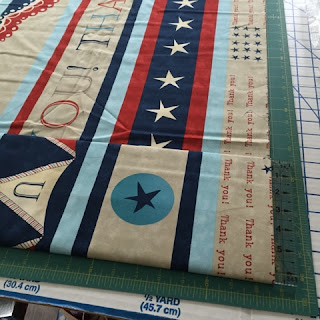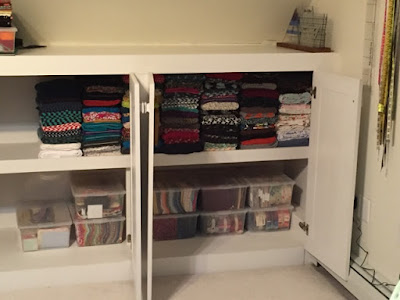 I've been asked how I organize my knit fabric in neat piles, which make visualization easy and access reasonable. If you really want quick and efficient access to your fabrics, you should store each fabric vertically like books in a bookshelf. My shelves are not that adjustable, and I'd end up wasting some of my precious storage space, so I choose to store in piles. I've categorized my quilting fabrics roughly by color or collection, but my knits collection seems to be growing too fast so it's pretty random in there.
I've been asked how I organize my knit fabric in neat piles, which make visualization easy and access reasonable. If you really want quick and efficient access to your fabrics, you should store each fabric vertically like books in a bookshelf. My shelves are not that adjustable, and I'd end up wasting some of my precious storage space, so I choose to store in piles. I've categorized my quilting fabrics roughly by color or collection, but my knits collection seems to be growing too fast so it's pretty random in there. This is the product I bought on Amazon. Click here to buy boards It's meant for die-hard comic book collectors to display and store their precious comics in special acid-free baggies. Well, we collect something precious, too. It's FABRIC! The boards are acid free and if you want to store your fabric vertically, you will want to leave the boards in each piece of fabric for support. I often slide mine out after using it for folding the fabric, but for flimsy fabric, I will sometime choose to leave it in. I'm also too cheap to buy more, and I have more than 100 pieces of fabric. Trust me, a lot more.
This is the product I bought on Amazon. Click here to buy boards It's meant for die-hard comic book collectors to display and store their precious comics in special acid-free baggies. Well, we collect something precious, too. It's FABRIC! The boards are acid free and if you want to store your fabric vertically, you will want to leave the boards in each piece of fabric for support. I often slide mine out after using it for folding the fabric, but for flimsy fabric, I will sometime choose to leave it in. I'm also too cheap to buy more, and I have more than 100 pieces of fabric. Trust me, a lot more. Fold the fabric lengthwise with selvage edges together. Then fold again, but under-fold by a little bit, maybe 1/2", so that the gnarly selvages are hidden by the neatly folded edge. If your knit is very curly, under-fold by more, maybe 1 to 1-1/2," depending on how much curling there is. In this picture, the selvage is seen on the left side, slightly inside the first fold.
Fold the fabric lengthwise with selvage edges together. Then fold again, but under-fold by a little bit, maybe 1/2", so that the gnarly selvages are hidden by the neatly folded edge. If your knit is very curly, under-fold by more, maybe 1 to 1-1/2," depending on how much curling there is. In this picture, the selvage is seen on the left side, slightly inside the first fold.  Now, lay two pieces of comic board, side by side but overlapping a lot, so that the edges hang out beyond the fabric by an inch or so.
Now, lay two pieces of comic board, side by side but overlapping a lot, so that the edges hang out beyond the fabric by an inch or so. Roll up the fabric on these two boards, uncurling the curling edges as much as you can as you go. If it's really curly, you can roll a few times, and then reach your fingers into the edge to unroll the selvage. It's not perfect, but these are knits, and there's only so much you can make them behave. This knit I'm using is a cool max knit, so it's not curly. A good cotton lycra will curl a lot and you have to choose your battles with it. Let it curl a little so you can move on!


If you are going to take your comic boards out, do it now. If not, it's possible to push it in to make it less visible. I definitely take out at least one. I'm going to need all the boards I can get!

Now, stack the fabric you've rolled neatly, lining up the prettiest ends. Since fabric widths are variable, the back end isn't going to be so neatly lined up, but the side you will see should be as tidy as you can get it. Stack on your shelves as space-efficiently as you can. I leave a few inches free at the top of my piles because these built-in shelves aren't finished on their undersides, and bending down to get these babies out is a little awkward.

For woven fabrics, (I'm talking about quilting cotton, which is universally 42-44" wide,)

Again, fold the fabric with selvage edges together. Do not fold again at this point. Lay out the fabric with selvages on the left side, and use your favorite 6 or 6.5" by 24" ruler, or something close to these measurements.
Roll the fabric up on this ruler, fairly tightly, making sure you are keeping the edges straight. Use your hands to flatten out as you go.



 Slide the ruler out carefully, and fold the fabric in half making a neat folded edge for display.
Slide the ruler out carefully, and fold the fabric in half making a neat folded edge for display.
Stack in piles neatly. I do not use this method for more than 3 continuous yards. The last fold ends up distorting the fabric if the rolled fabric is too thick. I omit that last fold and keep large pieces of fabric stacked separately in a deep cabinet. These are usually pieces meant for backings or whole bolts of solids meant for many quilt backgrounds.
Now, go back to creating; all this tidying is not going to get that fabric sewn!

